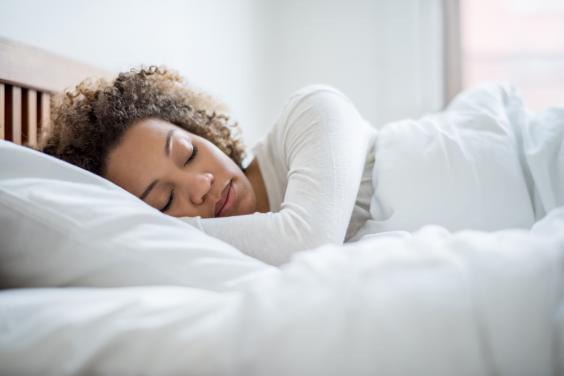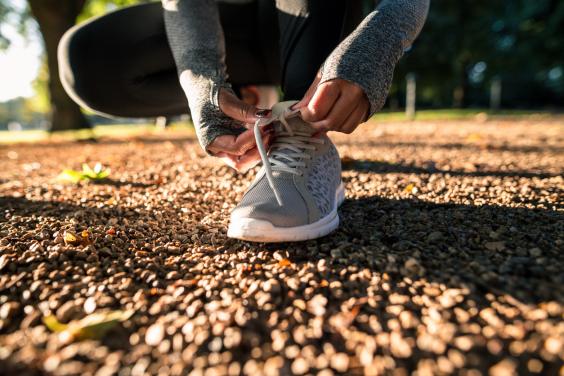14 of the biggest myths about sleep, debunked - Part 1
'We are now forced to wonder whether there are any biological functions that do not benefit by a good night's sleep'
For something so fundamental to our lives, there's a lot that we don't get right about sleep.
Until recently, we didn't even have good answers to the question of "why" we sleep, as UC Berkeley neuroscience and psychology professor Matthew Walker explains in his recent book, "Why We Sleep: Unlocking the Power of Sleep and Dreams."
We're better at answering that question now. We know that sleep restores the immune system, balances hormone levels, lowers blood pressure, cleanses toxins from the brain, and more.
"[W]e no longer have to ask what sleep is good for," wrote Walker.
"Instead, we are now forced to wonder whether there are any biological
functions that do not benefit by a good night's sleep. So far, the
results of thousands of studies insist that no, there aren't."
But while we know far more about sleep now than we used to, there are a huge number of myths about sleep that persist. Many of these stem from not understanding the full importance of sleep; other myths have been created by people trying to sell products to improve nightly rest.
These are some of the most prominent myths — and the facts.
1. Myth: You can become a morning person.
 Spend enough time online and you'll certainly encounter some version
of the "you can accomplish so much if you start waking up a 4:30 a.m.
every day" blog post.
Spend enough time online and you'll certainly encounter some version
of the "you can accomplish so much if you start waking up a 4:30 a.m.
every day" blog post.
But the truth is more complex.
There are a number of factors that influence your chronotype — that is, whether you're a morning person, a night owl, or whether you fall somewhere in between. Your body clock changes throughout life and is influenced by factors like sunlight and genetics.
Researchers say that while most people can regulate their body clock to some degree (if you want to feel awake earlier, try getting morning sunlight), there's a limit to how much it can be changed. And for some people, becoming a morning person (or switching to become a night owl) is basically impossible.
2. Myth: You can get by on less than seven hours a night
If you need a cup of coffee in the morning to feel awake, you didn't get enough sleep.
Scientists like Walker say that if you want to figure out how much sleep you actually need, you should spend about a week letting yourself fall asleep when you are tired and then waking up naturally, without an alarm.
As it turns out, the vast majority of people need between seven and nine hours of sleep a night. There are a few people out there who for biological reasons either need more sleep or can get by with less, but statistically, you're probably not one of them.
People tend to think they can get by with less sleep because after a few days or weeks of 5 or 6 hours, that just starts to feel like "normal." But even though people assume they've adjusted, tests show that they are performing in an impaired state.
3. Myth: The only long-term consequence of not getting enough sleep is that you'll be tired.
So you're tired. No big deal, right?
Unfortunately, that's not the case. As Walker wrote, sleep has a huge variety of benefits for your health.
Not getting enough sleep is associated with a laundry list of negative health effects, including memory problems, increased cancer risk, depression and anxiety, heart disease, and Alzheimer's linked buildups in the brain.
4. Myth: Snoring is annoying but no big deal otherwise.
 If you're consistently snoring at night (not just when you have a cold), you should get checked out by a medical professional.
If you're consistently snoring at night (not just when you have a cold), you should get checked out by a medical professional.
Snoring can be indication that you are dealing with sleep apnea, a sleep disorder that can cause other medical problems over time, according to the Cleveland Clinic. It's caused by decreased airflow that can strain the heart and cause cardiovascular problems and is also linked to weight gain.
Fortunately, sleep apnea is treatable, and people who've been treated say they start feeling better-rested in the mornings.
5. Myth: You can make up for sleep on the weekend.
 If you've had a week of late nights and early mornings, you may think
you can just make up for it by sleeping until noon on Saturdays and
Sundays.
If you've had a week of late nights and early mornings, you may think
you can just make up for it by sleeping until noon on Saturdays and
Sundays.
Unfortunately, as chronobiologist Till Roenneberg explains in his book, "Internal Time: Chronotypes, Social Jet Lag, and Why You're So Tired," it's best for your body to keep a consistent schedule.
You can throw your body off even more by trying to catch up on sleep over the weekends, which can make it harder to sleep during the week (it's like changing time zones).
Still, if you're really sleep-deprived and can catch a few extra hours of shut-eye, go for it. It's not a long-term solution and can't make up for all the effects of sleep deprivation, but some research indicates it's better than stumbling on, bleary-eyed.
6. Myth: Sleeping pills like Ambien help you sleep.
It's easy to see the appeal of sleeping pill for someone struggling with insomnia.
But sleep experts caution that whatever is happening after you take a sleeping pill, it's not natural sleep — and if you look at the brainwaves of people who have taken pills like Ambien, they aren't getting real sleep.
As Walker puts it in his book, people who have taken sleeping pills aren't awake, but they aren't actually sleeping either. They're sedated.
And there are some indications that medication-induced "sleep" could be harmful. Some research indicates that zolpidem (Ambien) may weaken the brain cell connections associated with learning — it may be causing memory damage over time.
Plus, people who stop taking sleeping pills often experience a "rebound" insomnia afterwards that pushes them back to those same pills.
7. Myth: It's better to get up early to work out than to sleep in.
 Getting a workout in is essential for your health. It'll help you sleep better too. But experts say you shouldn't skip your sleep to do it.
Getting a workout in is essential for your health. It'll help you sleep better too. But experts say you shouldn't skip your sleep to do it.
For one thing, you need sufficient sleep to recover and heal your body if you've been exercising.
You're only getting stronger when you rest; exercise itself is the process of injuring your body so it can recover stronger.
And even your muscle cells have their own body clock. If you don't feel awake, your muscles probably aren't either — and they aren't going to get the same benefits from exercise.
Look out for part two tomorrow.
Until recently, we didn't even have good answers to the question of "why" we sleep, as UC Berkeley neuroscience and psychology professor Matthew Walker explains in his recent book, "Why We Sleep: Unlocking the Power of Sleep and Dreams."
We're better at answering that question now. We know that sleep restores the immune system, balances hormone levels, lowers blood pressure, cleanses toxins from the brain, and more.
But while we know far more about sleep now than we used to, there are a huge number of myths about sleep that persist. Many of these stem from not understanding the full importance of sleep; other myths have been created by people trying to sell products to improve nightly rest.
These are some of the most prominent myths — and the facts.
1. Myth: You can become a morning person.

But the truth is more complex.
There are a number of factors that influence your chronotype — that is, whether you're a morning person, a night owl, or whether you fall somewhere in between. Your body clock changes throughout life and is influenced by factors like sunlight and genetics.
Researchers say that while most people can regulate their body clock to some degree (if you want to feel awake earlier, try getting morning sunlight), there's a limit to how much it can be changed. And for some people, becoming a morning person (or switching to become a night owl) is basically impossible.
If you need a cup of coffee in the morning to feel awake, you didn't get enough sleep.
Scientists like Walker say that if you want to figure out how much sleep you actually need, you should spend about a week letting yourself fall asleep when you are tired and then waking up naturally, without an alarm.
As it turns out, the vast majority of people need between seven and nine hours of sleep a night. There are a few people out there who for biological reasons either need more sleep or can get by with less, but statistically, you're probably not one of them.
People tend to think they can get by with less sleep because after a few days or weeks of 5 or 6 hours, that just starts to feel like "normal." But even though people assume they've adjusted, tests show that they are performing in an impaired state.
3. Myth: The only long-term consequence of not getting enough sleep is that you'll be tired.
So you're tired. No big deal, right?
Unfortunately, that's not the case. As Walker wrote, sleep has a huge variety of benefits for your health.
Not getting enough sleep is associated with a laundry list of negative health effects, including memory problems, increased cancer risk, depression and anxiety, heart disease, and Alzheimer's linked buildups in the brain.
4. Myth: Snoring is annoying but no big deal otherwise.

Snoring can be indication that you are dealing with sleep apnea, a sleep disorder that can cause other medical problems over time, according to the Cleveland Clinic. It's caused by decreased airflow that can strain the heart and cause cardiovascular problems and is also linked to weight gain.
Fortunately, sleep apnea is treatable, and people who've been treated say they start feeling better-rested in the mornings.
5. Myth: You can make up for sleep on the weekend.

Unfortunately, as chronobiologist Till Roenneberg explains in his book, "Internal Time: Chronotypes, Social Jet Lag, and Why You're So Tired," it's best for your body to keep a consistent schedule.
You can throw your body off even more by trying to catch up on sleep over the weekends, which can make it harder to sleep during the week (it's like changing time zones).
Still, if you're really sleep-deprived and can catch a few extra hours of shut-eye, go for it. It's not a long-term solution and can't make up for all the effects of sleep deprivation, but some research indicates it's better than stumbling on, bleary-eyed.
6. Myth: Sleeping pills like Ambien help you sleep.
It's easy to see the appeal of sleeping pill for someone struggling with insomnia.
But sleep experts caution that whatever is happening after you take a sleeping pill, it's not natural sleep — and if you look at the brainwaves of people who have taken pills like Ambien, they aren't getting real sleep.
As Walker puts it in his book, people who have taken sleeping pills aren't awake, but they aren't actually sleeping either. They're sedated.
And there are some indications that medication-induced "sleep" could be harmful. Some research indicates that zolpidem (Ambien) may weaken the brain cell connections associated with learning — it may be causing memory damage over time.
Plus, people who stop taking sleeping pills often experience a "rebound" insomnia afterwards that pushes them back to those same pills.

For one thing, you need sufficient sleep to recover and heal your body if you've been exercising.
You're only getting stronger when you rest; exercise itself is the process of injuring your body so it can recover stronger.
And even your muscle cells have their own body clock. If you don't feel awake, your muscles probably aren't either — and they aren't going to get the same benefits from exercise.
Look out for part two tomorrow.









No comments
Thanks for viewing, your comments are appreciated.
Disclaimer: Comments on this blog are NOT posted by Olomoinfo, Readers are SOLELY responsible for their comments.
Need to contact us for gossips, news reports, adverts or anything?
Email us on; olomoinfo@gmail.com